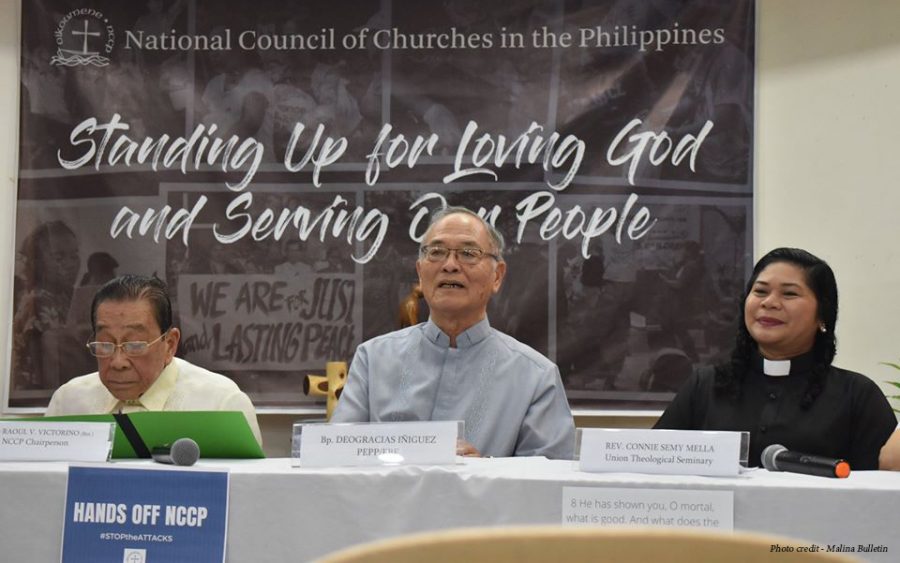CCA General Secretary condemns the Philippine government’s act of ‘Red-tagging’ the National Council of Churches in the Philippines
 Philippine ecumenical church leaders at a press conference in Manila; from left to right - Justice Raul Victorino (Chairperson, NCCP), Bishop Deogracias Iñiguez (Roman Catholic Church), and Rev Dr Connie Semy P. Mella
Philippine ecumenical church leaders at a press conference in Manila; from left to right - Justice Raul Victorino (Chairperson, NCCP), Bishop Deogracias Iñiguez (Roman Catholic Church), and Rev Dr Connie Semy P. Mella
“Indiscriminately labeling the National Council of Churches in the Philippines (NCCP) as part of some ‘front organization’ of local ‘Communist Terrorist Groups’ (CTG) is a reprobate act by the Department of National Defense (DND) of the Armed Forces in the Philippines (AFP), and such actions will only create fear among the NCCP staff and their families,” stated the Christian Conference of Asia (CCA) General Secretary Dr Mathews George Chunakara.
At a public hearing in the Lower House of the Congress of the Philippines, the Armed Forces of the Philippines’ (AFP) Deputy Chief of Staff for Intelligence labelled the National Council of Churches in the Philippines (NCCP) as a ‘Communist Terrorist Group’ front.
The General Secretary of the CCA condemns in the strongest possible terms this accusation against its member council as a direct act of red-baiting, which puts to risk the lives and limbs of NCCP staff members, officers, their loved ones, and friends.
Mathews George Chunakara said that the allegations of ‘front organizations’ supposedly collaborating with the CTG and funding them were part of an all-out war strategy of the government. The ongoing raids, illegal arrests, and vilification of those members of the people’s organizations that are critical of governments are part of a systematic military strategy to silence the critics of the government’s policies.
“The NCCP, an active member of the CCA comprised of several CCA member churches in the Philippines, has been consistently involved in human rights advocacy as part of its commitment of prophetic witness; especially since the martial law declaration almost half a century ago. The allegations levelled against the NCCP and the propaganda tactic of ‘red-tagging’ is deplorable,” said the head of the CCA. He also urged the Philippine government and its military to rethink its all-out war strategy, and stop the branding of ecumenical organizations such as the NCCP or any other church-related bodies as ‘communists’.
‘Red-tagging’ has often been directed towards individuals and organizations critical of the Philippine government, by which they are labeled as ‘communists’ or ‘terrorists’ regardless of their actual faith or affiliations. Human rights advocates and civil society organizations have increasingly been branded in the Philippines as supporters of the communist insurgency.
The United Nations Human Rights Council in 2018 reported, “At least 80 recognized human rights defenders, indigenous peoples’ representatives, and representatives of community-based organizations” were labelled by the Administration of President Rodrigo Duterte as ‘terrorists’, since they expressed concern about the deteriorating human rights situation in the country.
The CCA General Secretary also called on both the Government of the Republic of the Philippines and the National Democratic Front (NDF) to resume the stalled peace talks.
Mathews George Chunakara further commented that instead of labeling religious organizations such as the NCCP as ‘communist fronts’, the Philippine government must address the root causes of armed conflict, and the AFP must stop using military approaches which may further aggravate conflicts. The CCA maintains its proposition that only principled dialogue leads to negotiated peace, which advances social, economic, political, and cultural transformation of society; this is imperative for the resolution of the underlying causes of any armed hostility.










